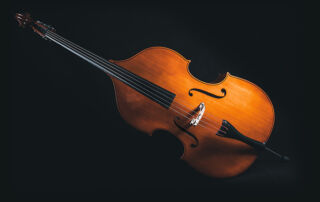Hello, my name is Benoît Chapeaux, cellist, and member of the National Orchestra of the Capitole of Toulouse for over two decades.
Every day as an instrumentalist, I ask myself questions about my practice. We have the incredible opportunity to learn, play, improve, and most importantly, be happy to have chosen the cello.
It is like an extension of oneself, of one's own sensitivity, because the sound produced by this instrument touches us, shakes us, and soothes us, as its range is close to the human voice.
The playing position and the points of contact with the body are unique. I am always moved when I see faces light up during the first encounter with this instrument, when the bow touches the strings and releases all its vibrations.
That's exactly what happened the first time I tried to produce a sound on my small cello, which was 5 years old at the time.
I continue to experience this pleasure every day. This opportunity to play is something to be aware of, and learning should be approached in the same way. Always maintain the joy, even when facing a technical difficulty.
Let's not lose sight of the essential, which is the music. The cello is a means to achieve it, to appreciate it, and to enhance it.

Reality reminds us, nonetheless, that we are not all the same. Each of us must adapt our physique to the instrument. Who hasn't heard at some point that you have to be tall to play the cello, that it's easier? I completely disagree with this statement.
First of all, the entire history of lutherie provides us with instruments of different makes; I'm not talking about the learning instruments in the following sizes: 1/8, 1/4, 1/2, 3/4, 7/8 (referred to as women's cellos by some), and the full-size cello.
Violin making in its current form, as far as cello invoices are concerned, first appeared in Italy, the birthplace of stringed instruments (see more details on the cello in this article), the great Cremonese school with Amati, Stradivarius, Guarnerius, and the Venetian school with Goffriller, Montagnana, to name a few, have ennobled instruments played by concert performers such as the late Rostropovich, Tortelier, Casals, and even today Yo-Yo Ma, Mork, Maisky, Capuçon, Gabetta... (all these prestigious musicians do not have the same height, hands, or arm length... obviously, this list is not exhaustive).
Their shape varies so much that some cellos do not fit in the cases sold by major manufacturers.

Some cellos, through history, are associated with religion. There used to be what were called procession basses. The Testore (Milanese school), for instance, had either a sort of nail fixed to the back to attach it to a belt or a hole in the scroll at the back to insert a wooden stick that rested on a belt around the musician's back.
You can imagine that these instruments had to be easily transportable and that the musicians had to be able to follow the pilgrim marches without difficulty (hence a certain lightness).
All these considerations I am sharing with you should convince you that it is possible to find a cello that you will love and, more importantly, one that will suit you best.
I assure you, of course, that we can find very good instruments beyond those that are not affordable for everyone.
It seems to me that it is essential to have an adequate "working instrument." Competent luthiers are at your disposal to help you make this choice.
The reason I insist so much on this point is that we cannot compromise on acquiring our cello. It will inevitably impact the notion of pleasure in practicing and interpreting pieces. Learning should not involve struggle or suffering.

My own experience and various encounters have led me to a more Epicurean vision, perhaps even hedonistic for some, regarding learning and practice. It is possible to create beauty without going through suffering.
The lives of various artists in multiple fields, which you have undoubtedly read about in different biographies, are indeed filled with unfortunate episodes, unhappy experiences, and misunderstandings from their contemporaries. These factors make them unique individuals, but not completely fulfilled. Their quest for the absolute in their art and their relationships can be devastating rather than creative.
I am aware that by stating such things, I may incur the wrath of my peers, rightly or wrongly.
To soften my remarks, I am not praising ease and dilettantism. After more than 40 years of daily practice, the level achieved does not come without hiccups. "Work is health," as they say. They are right; we achieve nothing without effort and discipline.
It seems easy and, indeed, naive to imagine playing the Bach suites after just two months of cello.
Let's never forget that the foundations must be solid if we want everything to last over time.
Know that every musician will tell you that it is important to question your way of playing every day, to be objective by being attentive, and to truly listen to yourself.
Nothing is guaranteed, and each student is unique. The difficulties of one are not necessarily those of another, and talent and abilities must be exploited to the fullest.
It is the teacher's role to help you and guide you.






